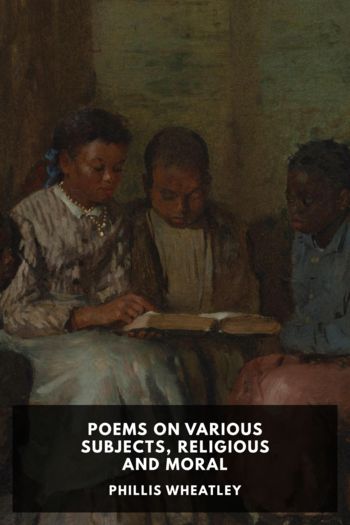The Autobiography of Benjamin Franklin - Benjamin Franklin (pocket ebook reader .txt) 📗

- Author: Benjamin Franklin
Book online «The Autobiography of Benjamin Franklin - Benjamin Franklin (pocket ebook reader .txt) 📗». Author Benjamin Franklin
When the company separated, and the papers were collected, we found above twelve hundred hands; and, other copies being dispersed in the country, the subscribers amounted at length to upward of ten thousand. These all furnished themselves as soon as they could with arms, formed themselves into companies and regiments, chose their own officers, and met every week to be instructed in the manual exercise, and other parts of military discipline. The women, by subscriptions among themselves, provided silk colours, which they presented to the companies, painted with different devices and mottos, which I supplied.
The officers of the companies composing the Philadelphia regiment, being met, chose me for their colonel; but, conceiving myself unfit, I declined that station, and recommended Mr. Lawrence, a fine person, and man of influence, who was accordingly appointed. I then proposed a lottery to defray the expense of building a battery below the town, and furnishing it with cannon. It filled expeditiously, and the battery was soon erected, the merlons being framed of logs and filled with earth. We bought some old cannon from Boston, but, these not being sufficient, we wrote to England for more, soliciting, at the same time, our proprietaries for some assistance, though without much expectation of obtaining it.
Meanwhile, Colonel Lawrence, William Allen, Abram Taylor, Esq., and myself were sent to New York by the associators, commissioned to borrow some cannon of Governor Clinton. He at first refused us peremptorily; but at dinner with his council, where there was great drinking of Madeira wine, as the custom of that place then was, he softened by degrees, and said he would lend us six. After a few more bumpers he advanced to ten; and at length he very good-naturedly conceded eighteen. They were fine cannon, eighteen-pounders, with their carriages, which we soon transported and mounted on our battery, where the associators kept a nightly guard while the war lasted, and among the rest I regularly took my turn of duty there as a common soldier.
My activity in these operations was agreeable to the governor and council; they took me into confidence, and I was consulted by them in every measure wherein their concurrence was thought useful to the association. Calling in the aid of religion, I proposed to them the proclaiming a fast, to promote reformation, and implore the blessing of Heaven on our undertaking. They embraced the motion; but, as it was the first fast ever thought of in the province, the secretary had no precedent from which to draw the proclamation. My education in New England, where a fast is proclaimed every year, was here of some advantage: I drew it in the accustomed style, it was translated into German,81 printed in both languages, and divulged through the province. This gave the clergy of the different sects an opportunity of influencing their congregations to join in the association, and it would probably have been general among all but Quakers if the peace had not soon intervened.
It was thought by some of my friends that, by my activity in these affairs, I should offend that sect, and thereby lose my interest in the Assembly of the province, where they formed a great majority. A young gentleman who had likewise some friends in the House, and wished to succeed me as their clerk, acquainted me that it was decided to displace me at the next election; and he, therefore, in good will, advised me to resign, as more consistent with my honour than being turned out. My answer to him was, that I had read or heard of some public man who made it a rule never to ask for an office, and never to refuse one when offered to him. “I approve,” says I, “of his rule, and will practice it with a small addition; I shall never ask, never refuse, nor ever resign an office. If they will have my office of clerk to dispose of to another, they shall take it from me. I will not, by giving it up, lose my right of some time or other making reprisals on my adversaries.” I heard, however, no more of this; I was chosen again unanimously as usual at the next election. Possibly, as they disliked my late intimacy with the members of council, who had joined the governors in all the disputes about military preparations, with which the House had long been harassed, they might have been pleased if I would voluntarily have left them; but they did not care to displace me on account merely of my zeal for the association, and they could not well give another reason.
Indeed I had some cause to believe that the defense of the country was not disagreeable to any of them, provided they were not required to assist in it. And I found that a much greater number of them





Comments (0)